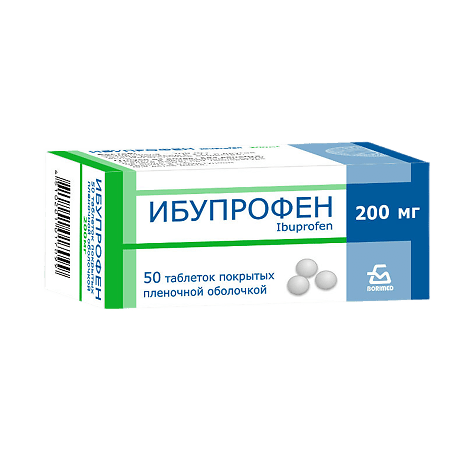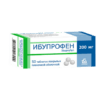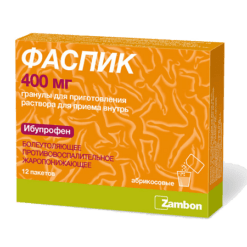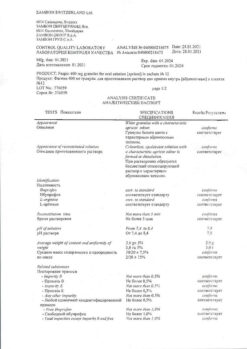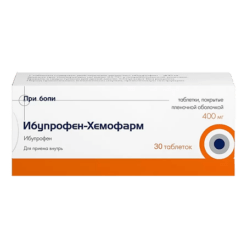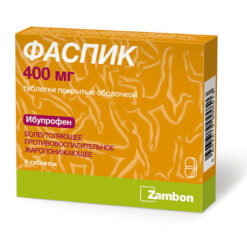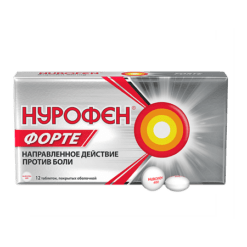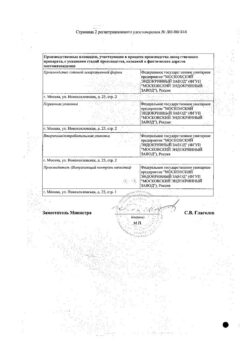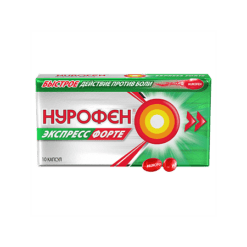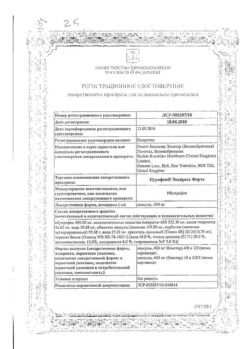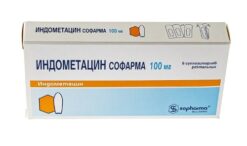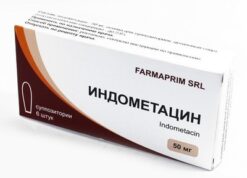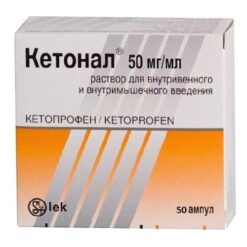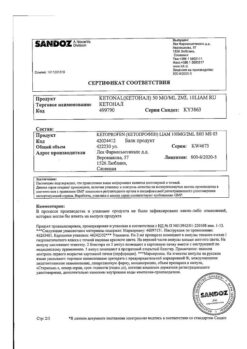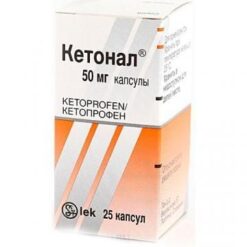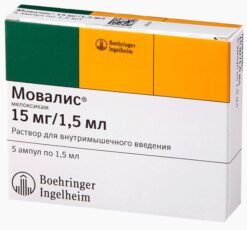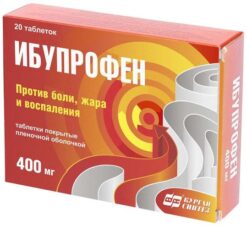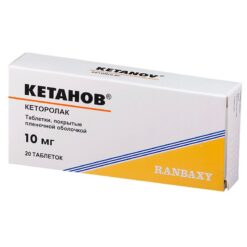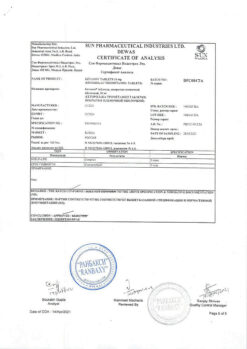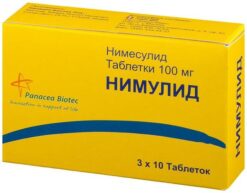No products in the cart.
Ibuprofen, 200 mg 50 pcs
€1.36 €1.24
Description
Pharmacodynamics
The drug Ibuprofen refers to non-steroidal anti-inflammatory drugs for external use. Ibuprofen has anti-inflammatory and analgesic effects. It suppresses the production of inflammatory mediators. Inhibits cyclooxygenase and blocks the biosynthesis of prostaglandins.
Inflammatory activity is caused by the normalization of increased vascular permeability, improvement of microcirculation, decrease of histamine, bradykinin and other inflammatory mediators liberation, ATP formation inhibition, which causes decrease of energy supply of inflammatory process. Analgesic effect of ibuprofen is associated with a decrease in the intensity of inflammation, reduction of production and weakening of bradykinin algogenicity. Dimethyl sulfoxide has a local non-specific anti-inflammatory, analgesic effect, promotes better and deeper penetration of ibuprofen into the tissue.
The ibuprofen ointment has a fast and pronounced analgesic effect – it relieves the pain syndrome, including arthralgia at rest and on movement. Reduces swelling and hyperemia. Reduces morning stiffness and limitation of mobility in the joints.
Pharmacokinetics
Absorption – high, half-life (Ti/2) -2 hours, binding to plasma proteins -90%. Excretion – by kidneys, with bile. Slowly penetrates into the joint cavity, stays in synovial fluid, creating higher concentrations in it than in plasma. Absorption is slightly reduced when the drug is taken after a meal.
The time to reach maximal concentrations when taken on an empty stomach is 45 minutes; 1.5-2.5 hours if taken after a meal. After absorption, about 60% of the pharmacologically inactive R-form is slowly transformed into the active S-form. Metabolized. It is excreted by kidneys (not more than 1% unchanged) and, to a lesser extent, in bile. It has biphasic elimination kinetics.
Indications
Indications
Active ingredient
Active ingredient
How to take, the dosage
How to take, the dosage
Interaction
Interaction
Ibuprofen may increase plasma concentrations of methotrexate, lithium and digoxin when used simultaneously with these drugs.
Ibuprofen, as well as other nonsteroidal anti-inflammatory drugs (NSAIDs) may decrease the effect of diuretics, calcium channel blockers, ACE inhibitors and other hypotensive drugs, which is associated with impaired prostaglandin synthesis in the kidneys. Concomitant use with potassium-saving diuretics may increase the level of potassium in the blood (if such a combination of drugs is necessary, plasma potassium level should be monitored).
There have been reports of an increased risk of bleeding in case of combined use of ibuprofen and anticoagulants, fibrinolytic agents.
In co-administration with antidepressants, barbiturates, zixorin, rifampicin, phenylbutazone, phenytoin the risk of severe intoxication increases due to increased production of hydroxylated active metabolites of ibuprofen.
Ibuprofen increases the hypoglycemic effectiveness of oral hypoglycemic agents, which requires adjustment of the dose of these drugs against the use of ibuprofen.
Glucocorticoid and mineralcorticoid hormones and colchicine increase the anti-inflammatory effects of ibuprofen and increase the risk of gastrointestinal damage.
When co-administered with cefamandole, cefoperazone, cefotetan, valproic acid and plikamycin, the risk of hypoprothrombinemia increases.
Cyclosporine and gold drugs increase the nephrotoxic effects of ibuprofen.
Ibuprofen increases the undesirable effects of estrogens when used together.
Ibuprofen weakens the effectiveness of the uricosuric effect of antipodagric agents.
Colestyramine slows absorption of ibuprofen.
Caffeine increases the analgesic effect of ibuprofen.
Ibuprofen increases the toxicity of ethanol.
When used together, acetylsalicylic acid weakens the effect of ibuprofen and increases its toxicity, this is due to displacement of ibuprofen from protein binding and its metabolism to form toxic hydroxylated metabolites.
Special Instructions
Special Instructions
Persons with gastrointestinal pathology. During the use of ibuprofen it is necessary to closely monitor the patients with gastrointestinal complaints, history of gastrointestinal ulcers, as well as ulcerative colitis or Crohn’s disease. Against the background of ibuprofen use in this group of patients, gastrointestinal bleeding or gastrointestinal ulceration/perforation may occur (first or repeated), which may not be accompanied by precursor symptoms. In all such cases, the drug should be withdrawn.
Persons with abnormalities of the blood system. Ibuprofen temporarily inhibits platelet aggregation, therefore, in patients with hemostasis disorders, careful monitoring of relevant laboratory parameters is necessary. With long-term use of ibuprofen systematic monitoring of peripheral blood is indicated.
Persons with liver disease. During the use of ibuprofen transient increase in the activity of liver enzymes is possible. During long-term therapy with ibuprofen as a precautionary measure, laboratory monitoring of liver function is indicated. If functional abnormalities persist or intensify, as well as if there are clinical manifestations of other liver lesions, ibuprofen should be discontinued. It should be remembered that hepatitis against the background of ibuprofen use may occur without prodromal manifestations.
Persons with pathology of the cardiovascular system. Since prostaglandins play an important role in maintaining normal renal blood flow, special caution is required when using ibuprofen in patients with renal dysfunction and chronic congestive heart failure, in persons receiving diuretics, as well as in patients with a significant decrease in circulating plasma volume (for example, before and after massive surgical interventions). In all these cases, monitoring of renal function is recommended as a precautionary measure. Discontinuation of the drug usually leads to restoration of renal function to the initial level.
Influence on laboratory values. If it is necessary to determine 17-ketosteroids in the urine, ibuprofen should be discontinued 48 hours before the test.
Impact on the ability to drive and operate machinery. During the use of ibuprofen it is necessary to refrain from all activities requiring increased attention, rapid mental and motor reactions.
It is not recommended to take ethanol during treatment.
Cherry and currant juice and sugar syrup increase the rate of absorption of ibuprofen.
To reduce the risk of gastrointestinal adverse events, the lowest effective dose should be used for the shortest possible course.
Contraindications
Contraindications
Side effects
Side effects
Overdose
Overdose
Symptoms: there is no typical clinical picture in ibuprofen overdose. Abdominal pain, nausea, vomiting, dizziness, lethargy, drowsiness, depression, headache, hypotension, seizures, heart rhythm disorders, acute renal failure, respiratory depression may occur.
Treatment: treatment measures include discontinuation of the drug, supportive and symptomatic therapy aimed at eliminating the resulting disorders, correction of acid-base status. It is possible to conduct forced diuresis with simultaneous administration of alkaline drinking, activated charcoal, to reduce ibuprofen reabsorption. There is no specific antidote. Gastric lavage is effective only within one hour after taking the drug.
Pregnancy use
Pregnancy use
It is contraindicated in the III trimester of pregnancy.
The use of the drug in I-II trimesters of pregnancy, should be closely monitored by a physician.
Similarities
Similarities
Additional information
| Weight | 0.026 kg |
|---|---|
| Shelf life | 3 years. |
| Conditions of storage | In a place protected from light and moisture, at a temperature not exceeding 25ºC. |
| Manufacturer | Borisov Medical Preparations Plant, Belarus |
| Medication form | pills |
| Brand | Borisov Medical Preparations Plant |
Other forms…
Related products
Buy Ibuprofen, 200 mg 50 pcs with delivery to USA, UK, Europe and over 120 other countries.

